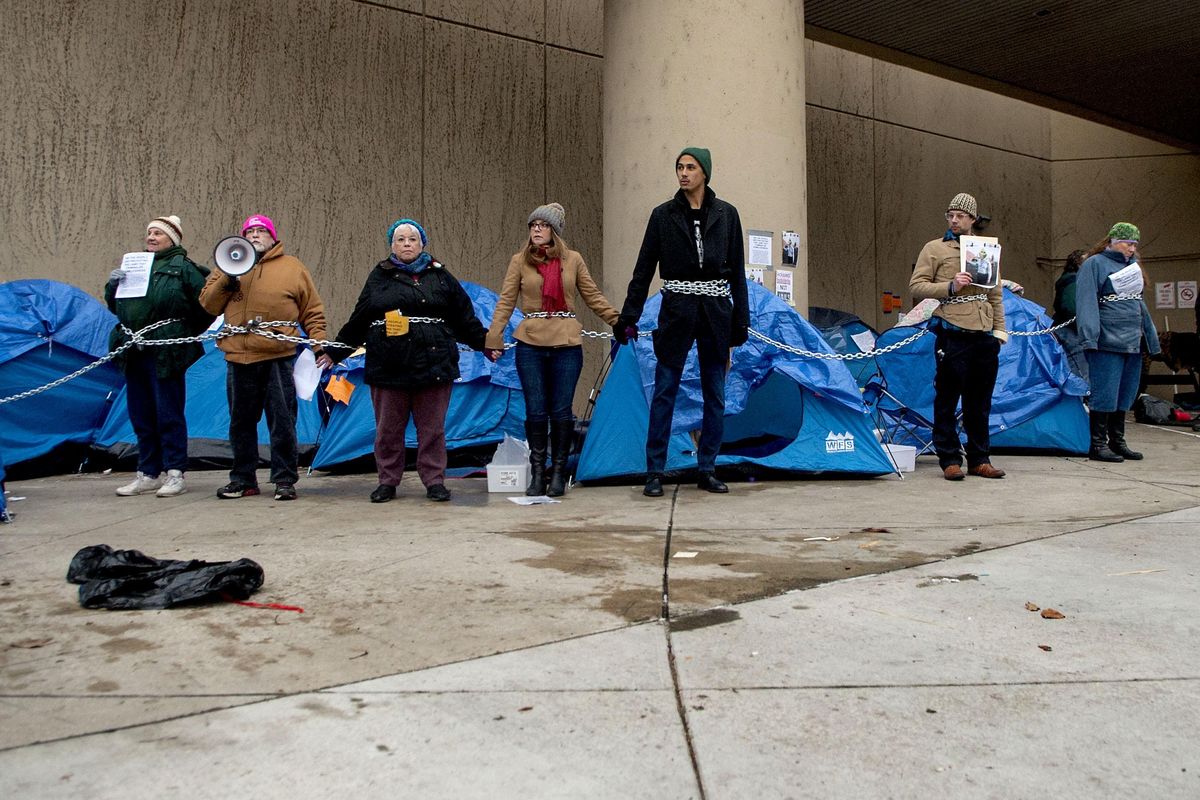Demonstrators, including Councilwoman Kate Burke, chain themselves together to protest removal of City Hall homeless camp

As temperatures dipped below freezing Saturday, about a dozen people, including Spokane City Councilwoman Kate Burke, chained themselves together in a line outside City Hall to protest how the mayor’s administration has dealt with homelessness.
The demonstration – which drew a large crowd as well as onlookers from the nearby ice-skating ribbon in Riverfront Park – was an attempt to stop police from clearing out the encampment at City Hall where dozens of homeless people have been sleeping for weeks.
Notices were posted at the site, dubbed “Camp Hope,” on Thursday, saying the people camped there would have to leave within 48 hours or their belongings would be seized. Demonstrators argued they had a First Amendment right to assemble outside the building.
They had expected police to arrive at 2:15 p.m., but hours later officers had made no attempt to shut down the event. Dozens of tents remained in place Thursday evening outside the northeast entrance to City Hall and scattered along North Post Street.
Demonstrators said the recent opening of two new warming centers was not enough to accommodate the hundreds of homeless people living in Spokane, and not enough to justify enforcement of city ordinances that ban sitting, sleeping and camping on public property. Some described how traumatic it can be to survive winter on the streets, hauling belongings through the snow, losing fingers to frostbite.

“We don’t have enough protections for them, and we often treat them with undignifying responses,” Burke said, a heavy chain padlocked around her waist. “And I just want the community to know that I’m here to support folks who are vulnerable and on the streets. We need to take some action here at the city.”
Burke said she is working on a “homeless bill of rights” resolution that would spell out various protections for homeless people. She also said the city needs thousands more affordable housing units.
The two new warming shelters at Salem Lutheran Church and 527 S. Cannon St. can house about 100 people. But several homeless people said they needed places to store their belongings so that they could attend job interviews, drug treatment and appointments for medical and mental health care.
“They need a place to put their stuff,” said Dave Bilsland, 61, who has been homeless in the past.
Echoing other demonstrators, Burke said the city should have secured additional shelter space in July, when Catholic Charities announced that its House of Charity would lose 150 of its 400 beds because of a funding shortfall.

“It’s the middle of December and we’re just opening up warming shelters,” Burke said. “In my mind, it was not a priority for the administration and the mayor himself. Maybe he wanted to save money for three months and not have any sort of shelter space. I’m not sure. But we can’t treat people like this.”
John Lemus, a member of the Spokane Human Rights Commission, said he was “appalled” by the situation. The city, he said, should have worked to connect the homeless demonstrators with services as soon as they arrived outside City Hall.
“I’m extremely disappointed, as a human rights commissioner, to see how the city has treated these people,” he said.
Lemus added that local philanthropists Don Barbieri and Sharon Smith, the founders of the Smith-Barbieri Progressive Fund, “have put in a ton of money to make sure that these folks are safe, they’re warm, that they have access to toilets and that they have access to legal representation.”
The demonstrators on Thursday sang Christmas jingles along with protest chants. Many said they were willing to be arrested.

One homeless man, 47-year-old Richard Dahl Jr., had set up tents in a parking space and said he planned to keep feeding the meter until he ran out of change or was taken to jail.
But a few people packed up and prepared to leave, saying they didn’t want to risk having their belongings seized by police.
“Me personally, I’m packing up my stuff because I’m tired of losing it,” said David Ham, who has been sleeping outside City Hall for weeks. At times he has shared a tent with his wife, Cynthia Ham, who is disabled and uses a motorized wheelchair.
Some passersby mocked Thursday’s demonstration. One man driving a blue Toyota pickup truck, for example, rolled down his window and scoffed when a demonstrator used the phrase “homeless rights.”
“What rights?” the driver asked.
Around 3:30 p.m., a man in a gray Washington State University baseball cap walked quickly up to Burke, wagging his finger and shouting, “You’re an embarrassment, Kate Burke! You’re an embarrassment to this city!”
The man, who declined to give his name, was immediately surrounded by demonstrators chanting “We love Kate!” Shouting matches ensued, while some sang “You’re a Mean One, Mr. Grinch.”
A half-dozen police officers arrived shortly after the man walked away. Cpl. Ron Van Tassel said they had responded for a report of an assault in which a man was “pushed around” by demonstrators, but the alleged victim did not want to press charges.
Van Tassel said the officers had not been called to shut down the demonstration, and he doubted the camp would be torn down on Saturday.
“I doubt we’re doing anything today,” he said. Burke left the protest at around 4 p.m.
But a city spokeswoman, Marlene Feist, said the camp could still be torn down under a law that prohibits camping on public property.
“It’s up to the police department when they feel it’s time to enforce it,” she said. “They probably won’t tell you when they’re going to do that, just like they won’t tell you when they’re going to do anything else.”